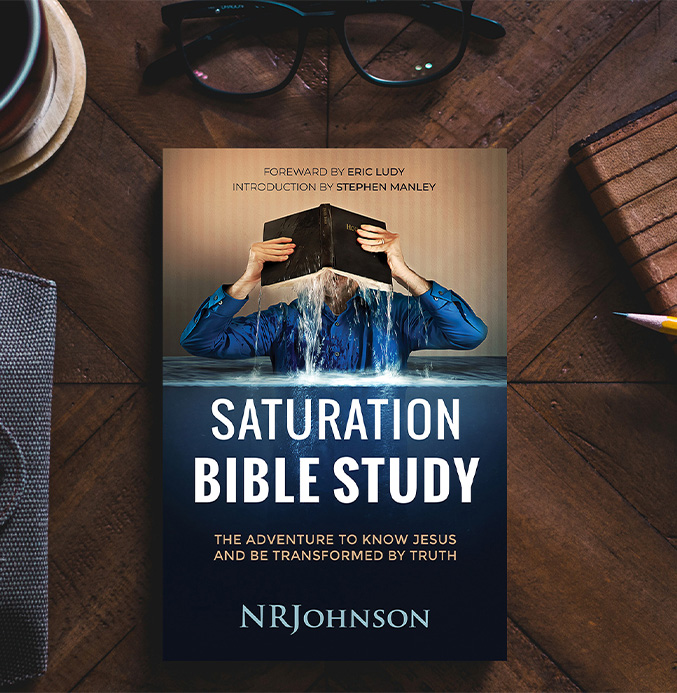We all know it is important to spend time in Scripture, but do we recognize that it is absolutely essential to our growth and maturity as Christians?
Our involvement in the Word of God is like a barometer that reveals whether we are thriving or dying in our spiritual life.
Over the years, I’ve come to the Bible for many reasons: for devotions, to prove someone wrong, for leisure reading, for homework, and to simply know what it says. But I fear, in the end, I’ve missed the true purpose.
There is simply one main reason to dive into the Word of God: to know Jesus. Not merely knowing about Jesus, but actually knowing Him, the Person.
Do you want a greater level of intimacy with Jesus? You must be in the Word.
7 R’s of Relationship
Simply put, Scripture is absolutely essential to our growth and maturity as Christians and critical for our understanding of and intimacy with Jesus. True Christian discipleship hinges upon God’s Word. But the reason we get into Scripture is because we want to grow in intimacy, oneness, and relationship with the Author.
If that is true, then how do Christians interact with the Word for growth? How do we build our lives around Jesus Christ by getting into His Word?
I’ve found seven key ways to interact with God’s Word that lead to greater growth and intimacy; I call them the seven Rs of relationship. If you do them not out of obligation or duty but to actually know Jesus Christ, they are guaranteed to lead you into greater relationship and closeness with Him.
1. Read
Read God’s Word
Reading God’s Word is essential to the Christian life. If we truly believe the Bible is God’s words (which it is), then we should delight in spending time in the Book.
Yet most of us treat Scripture like our English literature textbook in high school—it’s there when we absolutely have to look at it; otherwise, it makes a great doorstop. But God’s Word is not Shakespeare or Whitman; it is the very words of our King. And His Word says that it is living and active (Hebrews 4:12) and that we should delight ourselves in it (Psalm 119:16, 24) because it is sweeter than honey (Psalm 19:10 and 119:103).
Charles Spurgeon, the great prince of preachers, once declared:
True Bible-readers and Bible-searchers never find it wearisome. They like it least who know it least, and they love it most who read it most. They find it newest who have known it longest, and they find the pasture to be the richest whose souls have been the longest fed upon it.*
More about reading God’s Word:
- A Simple Guide to Reading the Bible (article + download)
- 5 creative ways to read the Bible that won’t be boring (article)
- 10 ways to read Scripture (article) or listen to the podcast episode
- 7 Bible reading plans to help you read God’s Word (podcast)
- How to read the Bible (article by Charles Spurgeon)
2. Retain
Memorize God’s Word
Many of us cringe when we hear the word “memorize.” I admit it is not one of my favorite words, and memorization has been difficult for me throughout the years. But one thing I’ve found is that when I write God’s Word upon my heart, it transforms my thinking and daily living.
We live in a time when memory isn’t needed. We have Google, Evernote, and our smartphones to do the hard thinking for us. And yet, while we may not use our brains as often as we should, they have incredible power to think, reason, and memorize. God made our brains capable of storing information and quickly retrieving it when necessary.
You are not at a disadvantage in the memory department.
We can memorize, but the reality is that we only memorize things we deem important and valuable—or that which is repetitive and gets stuck in our minds whether we want it to or not (like the song “It’s a Small World After All”).
More about memorizing God’s Word:
- 10 reasons why you should memorize Scripture (article)
- 6 quick tips to help you memorize Scripture (article)
- How to live a life of purity (podcast)
- The Value of Scripture Memorization (article by N.A. Woychuk)
- My favorite Bible memory app (and the one I use daily): Bible Memory (use code DEEPER to get 20% off the Pro version … totally worth it!)
3. Ruminate
Study God’s Word
Reading God’s Word is not a substitute for studying God’s Word. While reading the Bible is absolutely essential and you should have a plan to consistently read Scripture, going beyond the surface into Bible study will open up the text and your understanding in ways you never thought possible. And studying God’s Word doesn’t have to be complicated. It is easier than you think (though it will take work).
One of the most rewarding and transformational things I have done in the past two decades is to study Scripture. It has increased my understanding of and love for truth, given me a vision for living a godly life, and given me an incredible passion for Jesus Christ.
Remember, the reason we get into the Word is not for mere academics but to know Jesus. Even in Bible study, the purpose isn’t just head knowledge but greater intimacy and relationship with God Himself.
A lot could be said about how to study the Bible, but here are some articles and podcasts to get you started …
More about studying God’s Word:
- How to study the Bible (overview page)
- The purpose of Bible Study (article)
- 5 types of Bible studies (article)
- What is “Saturation Bible Study”? (article)
- 6 helpful hints for Saturation Bible Study (article by Stephen Manley)
- Get the book by NRJohnson: Saturation Bible Study
4. Relish
Delight In God’s Word
God is clear that we are to find delight and joy in His Word. What is interesting is that reading and studying the Bible is not a punishment; it should be one of our greatest joys and one of the things we look forward to most. Never once have I looked at a piece of dark chocolate and cringed, wishing I didn’t have to eat it—I always delight in partaking of its chocolatey goodness.
When we have a proper understanding of God’s Word, we discover that we are to relish it. It is to be our delight and joy because it reveals Truth (Jesus Christ) and thereby gives us life (see John 14:6 and 17:17).
More about delighting in God’s Word:
- Charles Spurgeon’s simple secret to enjoy reading your Bible (article)
- 10 benefits of studying the Bible (podcast)
- Find your delight in Jesus (podcast)
5. Recite
Declare God’s Word
God’s Word has an amazing aspect to it—when you read, study, and are transformed by its Truth, you can’t hold it in! Scripture creates a volcano within your life and has to come out.
You may not be called to be a preacher or a teacher—two obvious ways of declaring God’s Word—but everyone who is changed by God’s Word has a pressing within to declare it. This isn’t “declare it or else”; rather, this is more like viewing an incredible sunset.
When we behold an incredible sunset, a “wow” escapes our lips. We don’t try; it just comes out. The same is true when we get into Scripture—when we see Jesus as He is, when we are transformed by His Word, we just can’t help ourselves from telling others.
Whether you have the opportunity to preach, teach, blog, evangelize, or tell your friends and family about the truth God has been revealing and using to transform your life, declaring God’s Word is important to your spiritual growth.
More about declaring God’s Word:
6. Rest
Build Your Life Upon God’s Word
If we wanted to build a house, we would first set the foundation. If the foundation were weak, the building would be weak.
Scripture is our foundation, our bedrock, for living. It is the truth we boldly stand upon. It is the standard the Holy Spirit uses to test us. It is the very words of God, which all point to Jesus Christ and His work upon the Cross.
I must have a foundation to build my life upon. I need unchanging truth to be the guide of my life. I need security, a rock beneath my feet, to make it through the trials and temptations I face each day. As a Christian, my foundation is Jesus Christ and His unchanging Word. He does not change and cannot lie, and neither can His Word. It is a sure promise that I can take to the bank.
More about resting in God’s Word:
- Some Reasons Why I Believe The Bible To Be The Word of God (article by R.A. Torrey)
- One thing God cannot do (podcast)
- Remembering that God is faithful will change your life (podcast)
- Living the truth is different than listening to it (article)
7. Respond
Be Transformed by God’s Word
Ultimately, my goal is to be transformed into Christ’s likeness. I, who once walked in darkness, am to walk in light, and I need the powerful, enabling work of the Holy Spirit to take my heart of darkness and change my very nature and character. It is not enough to merely have the outward appearance of being different; I must become different on the inside, which is something I cannot do in and of myself.
The key to Christlikeness is to respond to the Word and allow the Spirit of God to transform me. I cannot approach God’s Word with an arms-folded, I-have-it-all-together, I-don’t-need-anything attitude. I must come broken, arms open, willing to respond to the Truth and desiring the Holy Spirit to do His work within me.
When I have an attitude of response—the desire to be transformed—then I can’t remain the same when I get into Scripture. If Scripture is a double-edged sword, then when I get close to it, I will be cut and changed.
Will you approach Scripture with the desire to “come to the unity of the faith and of the knowledge of the Son of God, to a perfect man, to the measure of the stature of the fullness of Christ” (see Ephesians 4:13 NKJV)? Will you allow the Word of God to be the measuring rod in your life that the Holy Spirit tests you against? Will you rest upon and respond to Scripture so He can transform your heart and mind (see Romans 12:1-2; 2 Corinthians 3:17-18, 5:17; 1 John 2:6, 3:2-3)?
More about responding to God’s Word:
- Don’t do Bible study unless you’re willing to do this (article)
- The secret barometer of your spiritual life (article)
- 3 reasons why Scripture is important to your growth and maturity in Christ (article)
- Conformed Unto Godliness (a study in Titus 2:11-15) (podcast)
.
*C. H. Spurgeon, “God’s Thoughts and Ours,” in The Metropolitan Tabernacle Pulpit Sermons, vol. 57 (London: Passmore & Alabaster, 1911), 188.
Dive Even Deeper
Disclosure of Material Connection: Some of the links in the post above are “affiliate links.” This means if you click on the link and purchase the item, deeperChristian will receive an affiliate commission (with no additional cost to you). It is a great way to support the work and ministry of deeperChristian. Regardless, we only recommend products or services we use personally and believe will add value to our readers. We are disclosing this in accordance with the Federal Trade Commission’s 16 CFR, Part 255: “Guides Concerning the Use of Endorsements and Testimonials in Advertising.”










